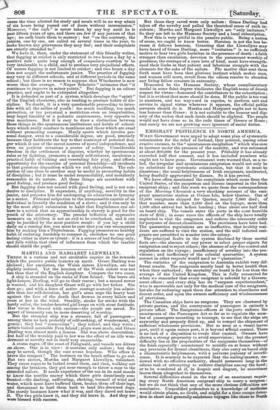MARTHA AND MARGARET LLEWELLYN.
TIMER is a curious and not creditable caprice in the rewards which the pensive public bestows on merit. Grace Darling was idolized ; her emulators, the Welsh sisters Llewellyn, are but slightly noticed. Yet the heroism of the Welsh sisters was not less than that of the English daughter. Compare the two cases.
A ship is stranded on the rocks of Fern Island. The brave old light-keeper, Darling, will go to their rescue ; but a second rower is wanted, and his daughter Grace will go with her father. She does go ; and with a force of active courage scarcely less admir- able than her self-devotion, her girl's arms urge the heavy boat against the face of the death that frowns in every billow and roars at her in the wind. Steadily, stroke for stroke with the hardy sailor, the tender-hearted girl keeps on with stout fortitude. Her virtue is blessed with success—the people are saved. No aspect of humanity can be more deserving of worship.
But the stranded ship was a steamer, full of passengers— among them no lack probably of self-seeking, of wonderment, of gossip ; they had " connexions" ; they talked, and they wrote ; artists visited accessible Fern Island ; plays were made, and Grace .Darling was almost made a lioness. She was above desecration ; ,bat half of the worship paid to her was the effect of an idle won- derment
ent at novelty not n itself very respectable.
A storm rages off the coast of Fishguard, and vessels are driven on shore. One is in view : it contains only sailors ; but they may be saved, though the case seems hopeless. Who offers to brave the tempest ? The boatmen on the beach refuse to go out. But two sisters, Martha and Margaret Llewellyn, volunteer. They cause ropes to be lashed round them, and then, walking out among the breakers, they get near enough to throw a rope to the stranded sailors. It needs experience of the sea in its mad moods to know the terrible enemy which those girls dauntlessly con- fronted—the dashing, suffocating, choking, turmoil of wind and water, which must have buffeted them, beaten them off their legs, and threatened to burl them back to land like drowned dogs. The sturdy boatmen knew what it was, and they dared not brave it. The two girls knew it, and they did brave it. And they too were blessed with success.
But those they saved were only sailors : Grace Darling had taken off the novelty and palled the theatrical sense of such in- cidents; Martha and Margaret Llewellyn are " only imitators." So they are left to the Humane Society and a local subscription.
Now this is very pitiful in the pensive public. Being a nation of sense, we ought to know better. Heroism is not the less be- cause it follows heroism. Granting that the Llewellyns may have heard of Grace Darling, mere " imitation" is no sufficient motive to bear two girls harmless in the presence of death : a faith stronger than emulation, devotion to the paramount worship of goodness, the courage of a pure love of kind, must havestrength- ened their limbs in that patient and laborious struggle with the elements for the sake of the sailors. The motive that sent them forth must have been that glorious instinct which makes man, and woman still more, revolt from the odious resolve to abandon any living fellow creature in extremity. Honoured be the Humane Society, whose complimentary medal in some faint degree vindicates the English sense of decent respect for virtue—honoured the contributors to the subscription ; but it is evident that more should be done. If the public is too vast in numbers, and too wayward in caprice, to perform suit and service to signal virtue wherever it appears, the official public servants should do it. Martha and Margaret ought not to have less honour than Grace : it is not suitable to the honour and dig- nity of the nation that such deeds should be slighted. The people would not have done so in the rude times of Greece or Rome ; and surely we are not growing more ignorant of social duties.


























 Previous page
Previous page